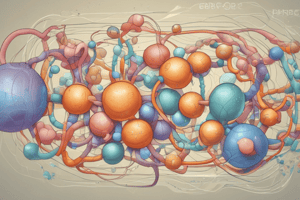Podcast
Questions and Answers
Apa peran hormon insulin dalam metabolisme karbohidrat?
Apa peran hormon insulin dalam metabolisme karbohidrat?
- Merangsang glukoneogenesis
- Meningkatkan penyerapan glukosa oleh sel otot (correct)
- Menurunkan kadar glukosa dalam darah
- Mempromosikan pembentukan glikogen pada sel hati
Apa yang dimaksud dengan nitrogen balance dalam metabolisme protein?
Apa yang dimaksud dengan nitrogen balance dalam metabolisme protein?
- Perbandingan antara jumlah protein yang dikonsumsi dibandingkan dengan karbohidrat dan lemak (correct)
- Pengukuran berapa banyak protein yang dikeluarkan dari tubuh
- Perbandingan antara asam amino esensial dan non-esensial
- Pengukuran seberapa banyak protein yang dikonsumsi dibandingkan yang dikeluarkan dari tubuh
Apa yang menjadi molekul fokus dalam metabolisme lipid?
Apa yang menjadi molekul fokus dalam metabolisme lipid?
- Glukosa (correct)
- Glikogen
- Trigliserida
- Amonium
Apa hasil akhir dari siklus Krebs?
Apa hasil akhir dari siklus Krebs?
Apa peran hormon glucagon dalam regulasi kadar gula darah?
Apa peran hormon glucagon dalam regulasi kadar gula darah?
Flashcards are hidden until you start studying
Study Notes
Metabolisme
Metabolisme is the set of life-sustaining chemical transformations within the cells of living organisms. It involves the conversion of various biochemical compounds, including carbohydrates, proteins, fats, and nucleic acids into energy necessary to sustain life. This process can be divided into two main types: catabolic reactions, which break down molecules to release energy; and anabolic reactions, which build up larger molecules using the released energy.
Respirasi Seluler
Cellular respiration is one of the central processes of cellular metabolism and takes place inside the mitochondria. In this process, glucose from food is converted into carbon dioxide and water, with some of the resulting energy being stored in ATP (adenosine triphosphate), while another portion is released as heat to maintain body temperature. There are three stages of cellular respiration: glycolysis, the citric acid cycle (also known as the Krebs cycle or TCA cycle) and oxidative phosphorylation. Each stage helps convert more complex organic nutrients into simpler ones and releases energy stored in bonds between atoms.
Metabolisme Karbohidrat
Carbohydrate metabolism refers to all the enzymatic pathways involved in the breakdown, synthesis, transport, absorption, storage, and utilization of carbohydrates by living beings. Glucagon, hormone secreted by the pancreas, plays an important role in regulating blood sugar levels by reducing the amount of glucose taken up by liver cells, thereby stimulating gluconeogenesis, causing the production of more glucose. Insulin also has influence over many aspects of carbohydrate metabolism, such as increasing glucose uptake by muscle cells, promoting glycogen (glucose polymer) formation with liver cells, and decreasing hepatic gluconeogenesis.
Metabolisme Lemak
Lipid metabolism centers around triglycerides, which consist of fatty acids attached to glycerol. These lipids play several roles in energy distribution within the human body, providing a source of fuel when other sources like glucose and amino acids run low. Lipid metabolism includes both lipogenesis (the creation of new lipids) and lipolysis (the breaking down of existing lipids). Hormones such as insulin play key roles in controlling these processes, affecting the rates at which they occur.
Metabolisme Protein
Protein metabolism deals primarily with the synthesis and degradation of protein molecules. When considering nitrogen balance—a measure of how much protein is consumed versus excreted—dietary factors like calorie intake and diet composition can impact it significantly. For example, excessive calories may lead to weight gain even if the person consumes enough protein because excess calories will be converted to fat rather than protein molecules. On the other hand, diets deficient in essential amino acids could lead to negative nitrogen balances despite adequate overall protein consumption.
Siklus Krebs
The Krebs cycle, also called the citric acid cycle or TCA cycle, is a key component of cellular respiration that provides energy for our bodies through chemical reactions involving oxygen. During its operation, hydrogen atoms are stripped away one after another until the remaining molecule is CO2, leaving behind electrons that flow out of the electron transport chain where protons pumped across the membrane generate energy via oxidative phosphorylation. This process ultimately leads to the generation of ATP, which serves as the primary currency of cellular energy exchange throughout the entire body.
Studying That Suits You
Use AI to generate personalized quizzes and flashcards to suit your learning preferences.




